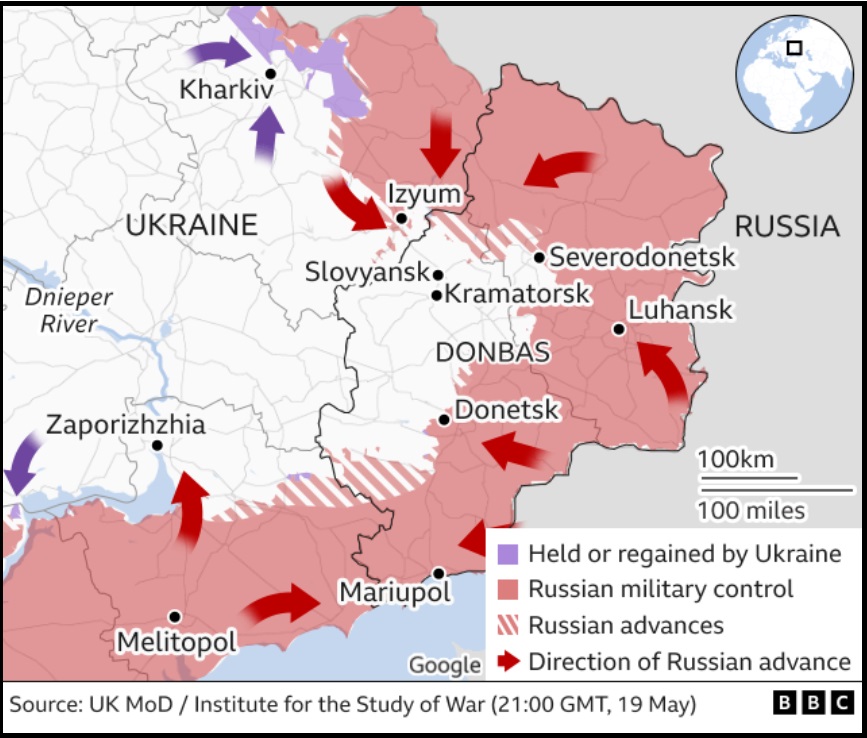The Associated Press [HERE] and more importantly the U.S. Intel Community outlet, the Washington Post [HERE], are beginning to change direction in their narration of the war in Ukraine.
 Both sources of information are starting to position Eastern Ukraine as a lost cause, with the Washington Post giving specific examples of conscripted Ukraine fighters who are abandoning the effort in the donbas region. As noted, “after three months of war, this company of 120 men is down to 54 because of deaths, injuries and desertions. The volunteers were civilians before Russia invaded on Feb. 24, and they never expected to be dispatched to one of the most dangerous front lines in eastern Ukraine.”
Both sources of information are starting to position Eastern Ukraine as a lost cause, with the Washington Post giving specific examples of conscripted Ukraine fighters who are abandoning the effort in the donbas region. As noted, “after three months of war, this company of 120 men is down to 54 because of deaths, injuries and desertions. The volunteers were civilians before Russia invaded on Feb. 24, and they never expected to be dispatched to one of the most dangerous front lines in eastern Ukraine.”
The Ukraine commander, Serhi Lapko and one of his lieutenants, Vitaliy Khrus, “retreated with members of their company this week to a hotel away from the front. There, both men spoke to The Washington Post on the record, knowing they could face a court-martial and time in military prison.” Together, Lapko and Khrus describe the essential elements of a fragmented Ukraine fighting force up against a committed Russian military advance.
Even the Washington Post admits the Ukraine central government is desperate to push morale boosting propaganda which seems constructed from the efforts of the U.S. State Dept, specifically the intelligence community within it. “Videos of assaults on Russian tanks or positions are posted daily on social media. Artists are creating patriotic posters, billboards and T-shirts. The postal service even released stamps commemorating the sinking of a Russian warship in the Black Sea.”
These examples are targeted toward a western audience and likely not being carried out by independent Ukraine government operation in Kyiv. Promoting the image of Ukraine is a construct of the U.S. state dept and U.S. intelligence.
The global impression of Ukraine must remain elevated to continue the U.S. proxy war against Russia. However, as noted, the WaPo is starting to shift the goal posts and expectations away from a Russian defeat in the donbas region.
Most notably within paragraphs like this you can see the purposeful shift. “Lapko and Khrus’s concerns were echoed recently by a platoon of the 115th Brigade 3rd Battalion, based nearby in the besieged city of Severodonetsk. In a video uploaded to Telegram on May 24, and confirmed as authentic by an aide to Haidai, volunteers said they will no longer fight because they lacked proper weapons, rear support and military leadership.”
[…] Ukraine’s military rebutted the volunteers’ claims in their own video posted online, saying the “deserters” had everything they needed to fight: “They thought they came for a vacation,” one service member said. “That’s why they left their positions.”
Hours after The Post interviewed Lapko and Khrus, members of Ukraine’s military security service arrived at their hotel and detained some of their men, accusing them of desertion. The men contend that they were the ones who were deserted. (read more)
The Associated Press story flows in a similar line to the WaPo narrative; however, the AP must maintain the Western Government slant:
[…] Russia has intensified efforts to capture the cities of Sievierodonetsk and nearby Lysychansk, which are the last major areas under Ukrainian control in Luhansk.
Luhansk Gov. Serhii Haidai reported that Ukrainian fighters repelled an assault on Sievierodonetsk but Russian troops still pushed to encircle them. He later said Russian forces had seized a hotel on the city’s outskirts, damaged 14 high-rise buildings and were fighting in the streets with Ukrainian forces.
[…] Mariupol’s port has reportedly resumed operations after Russian forces finished clearing mines in the Azov Sea. Russian state news agency Tass reported that a vessel bound for Rostov-on-Don in southern Russia entered the port early Saturday.
In the call with Macron and Scholz, the Kremlin said, Putin emphasized that Russia was working to “establish a peaceful life in Mariupol and other liberated cities in the Donbas.”
[…] Ukrainian authorities have reported that Kremlin-installed officials in seized cities have started airing Russian news broadcasts, introduced Russian area codes, imported Russian school curriculum and taken other steps to annex the areas.
Russian-held areas of the southern Kherson region have shifted to Moscow time and “will no longer switch to daylight saving time, as is customary in Ukraine,” Russia’s state news agency RIA Novosti quoted Krill Stremousov, a Russian-installed local official, as saying Saturday. (read more)
